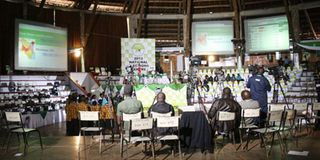Report reveals why polls system could have failed

PHOTO | FILE Observers and journalists wait for results at the Bomas national elections centre on March 6. 2013. An new report alleges shortcomings in the IEBC’s electronic equipment.
What you need to know:
- IEBC top brass say they have not seen the report, dated March 8
An audit report of the election results transmission system reveals, among other failures, that the set-up of the reporting server at the Bomas of Kenya was incomplete and it was brought in a day before the election.
The report comes as top electoral commission officials hold a management meeting in Mombasa on Monday for an evaluation of last month’s elections.
The move by the Independent Electoral and Boundaries Commission (IEBC) comes amid the emergence of the report by Next Technologies, a firm it hired to assess and test the results transmission system and how it failed.
On Sunday, IEBC chairman Issack Hassan confirmed the planned meeting, saying an internal and external audit would be done.
“There will be a meeting. It is also true that we will shortly roll out an internal audit to find solutions for the failures that may have occurred in preparing for last month’s elections,” he said.
But some commission members are said to be demanding an independent investigation into the process.
In its report, Next Technologies, made glaring revelations on what could have led to the failure of the multi-billion investment in last month’s election.
Though the report is dated March 8, Mr Hassan and the commission’s chief executive James Oswago on Sunday said they had not seen it.
It says the main reporting server that was to handle transferred data from the 34,000 polling centres was incompletely set up and was installed at the Bomas of Kenya just a day before the elections, the report says.
“The operating system and service packs were installed on the eve of the election. There was a lack of access to the server over the network and the stress tests could only be run by physically accessing the machine in the server room,” the report adds.
It says the failure of database replication from the main server to the reporting server prevented the server from being used to generate any reports.
The audit firm revealed how its staff were frustrated and denied access to the servers, forcing them to use personal computers to import database dumps and run queries.
“Next Technologies staff were also not given credentials to access the server to run reports there and had to depend on personal computers to import database dumps and run queries,” it adds.
The company says the IEBC was to set up database replication from the main server to the reporting server but this was put off until election day, with the human resources tasked to set up replication eventually failing to fulfil the requirement,” read the report.
The report findings also revealed that the visualisation and transmission systems made available by the commission were not tested.
“Next Technologies Ltd requested for the production environment for more than a week before the election but the software vendor and IEBC were still setting up and most of the human resources attached to this project were unavailable and unreachable,” the report says.
The commission sent faulty phones, some without passwords and SIM cards to its peripheral staff, making it difficult to use of them.
In Homa Bay County, the report revealed that the commission supplied batteries that ran out of charge after a few hours while in Nyandarua, some officials did not know how to use the facilities and systems.
In Kisii, some phones failed completely while some presiding officers did not heed advice on how to use the gadgets.
“In Busia, the modems worked well during the mock exercise but would not connect on election day,” the report says.
In Migori, passwords on mobile phones failed to work, with network failures reported at many polling centres.
The report says in Kakamega, the IEBC personnel were computer illiterate and had difficulties with the machines.
Other than the collapsed technology systems, a top commission official yesterday revealed to the Nation that clandestine hiring of staff in the crucial IT department, conspiracy allegations and illegal directives by a senior official to returning officers would be put under the spotlight during the audit.
On Tuesday, the Supreme Court is expected to give a full report of its judgment declaring Mr Uhuru Kenyatta the duly elected President.




